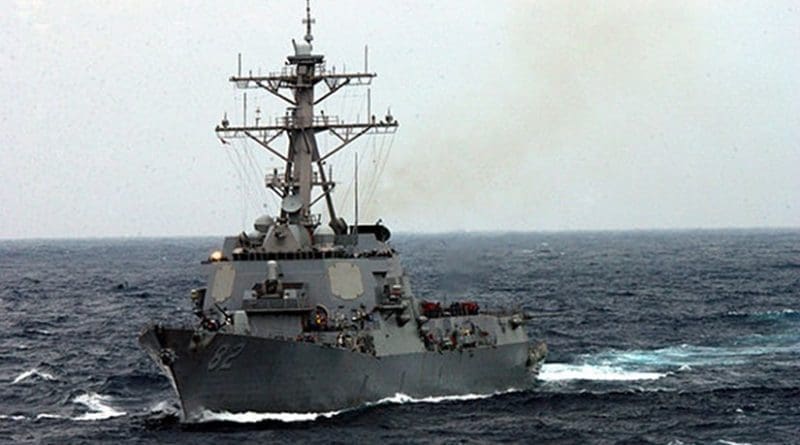US Naval South China Sea Passage Angered Beijing, But Pleases Some In China-Wary Vietnam
By RFA
Though harshly criticized by China, the passage this week of a U.S. Navy vessel through a part of the South China Sea claimed by Beijing drew approving comments from unofficial sources in Vietnam, a country that disputes Chinese assertions of sovereignty in the area.
On Tuesday, the USS Lassen, a guided-missile destroyer, cruised 12 nautical miles off an artificial island built by China on Zhubi reef in the Spratly Islands, an area that China describes as sovereign territory but which is subject to competing claims.
Chinese state media quickly lashed out at the move, calling it a “provocation” and a “dangerous attempt” to test China’s resolve, while Beijing on Tuesday summoned U.S. ambassador to China Max Baucus to make “serious representations of protest” over the incident.
There has been no official reaction yet from the government in Hanoi. However, regional experts in Vietnam welcomed the U.S. action, describing it as a demonstration of the right to freedom of navigation through the strategically vital region.
‘Good news’
“I think we should welcome and support the U.S. action,” Tran Cong Truc, former director of Vietnam’s Government Border Committee, said on Wednesday, adding, “This is good news.”
“What the U.S. did helps in part to make China’s claims [in the region] invalid,” Truc said. “China’s claims and ambitions go against the United Nations Convention on the Law of the Sea,” he added.
U.S. naval presence in the contested zone has “both positive and negative aspects,” though, Truc said.
“For Vietnam, I think the negative aspect is that conflicts could flare up now if both sides can’t restrain themselves and don’t respect legal procedures. This could affect the interests of other countries, including Vietnam.”
“This is something we don’t want,” he said.
Tuesday’s U.S. naval patrol past the Spratlys shows other countries that the U.S. takes seriously its responsibilities in the region, Rear Admiral Le Ke Lam, director of the Vietnamese Naval Academy said.
“Now they know that the U.S. will not withdraw from Southeast Asia or the Asia-Pacific,” Lam said, adding, “Otherwise, China would have assumed the U.S. is weak, and they would have become more aggressive.”
‘Too little, too late’
Vietnam expert Carl Thayer, a scholar at Australia’s University of New South Wales, meanwhile described the U.S. action as coming “too little, too late.”
“The U.S. should have acted once it had satellite information last year” that China was building on the reef, Thayer said.
Too much attention has been paid to the 12 nautical-mile distance kept by the U.S. warship as it traveled past the island built by China, he said.
“An artificial island is entitled to nothing except a 50-meter safety zone,” Thayer said, adding that the island at issue lies in any case within the economic exclusion zone of another country, the Philippines.
U.S. patrols in the South China Sea are not likely to stop China building more infrastructure in disputed areas, he said.
“The U.S. needs to go beyond freedom of navigation to preventing changes in the status quo.”
Reported by Gia Minh for RFA’s Vietnamese Service. Translated by Hanh Seide. Written in English by Richard Finney.


The economic benefits for the U.S. multinational corporations from China economy are so great. Why does the U.S. need to confront China? That was why the U.S. notified China that U.S. warships are not closer than 12 nautical miles away from artificial islands. Once the TPP is signed by Vietnam, this issue will subside leaving China freedom to build more artificial islands. If Vietnam is smart, it should also relies on its own cleverness and strength. In addition to good relationship with the U.S., Vietnam should also build good relationship with China. China is not stupid. China is the only country in the world so far that can prevent powerful multinational corporations such as Qualcomm, Intel, Microsoft, Google, Facebook, Apple, Cisco, etc. from completely owned important industries (Internet, IT, etc.) in China so that Alibaba, Tencent, Baidu, Huawei, etc. can thrive.